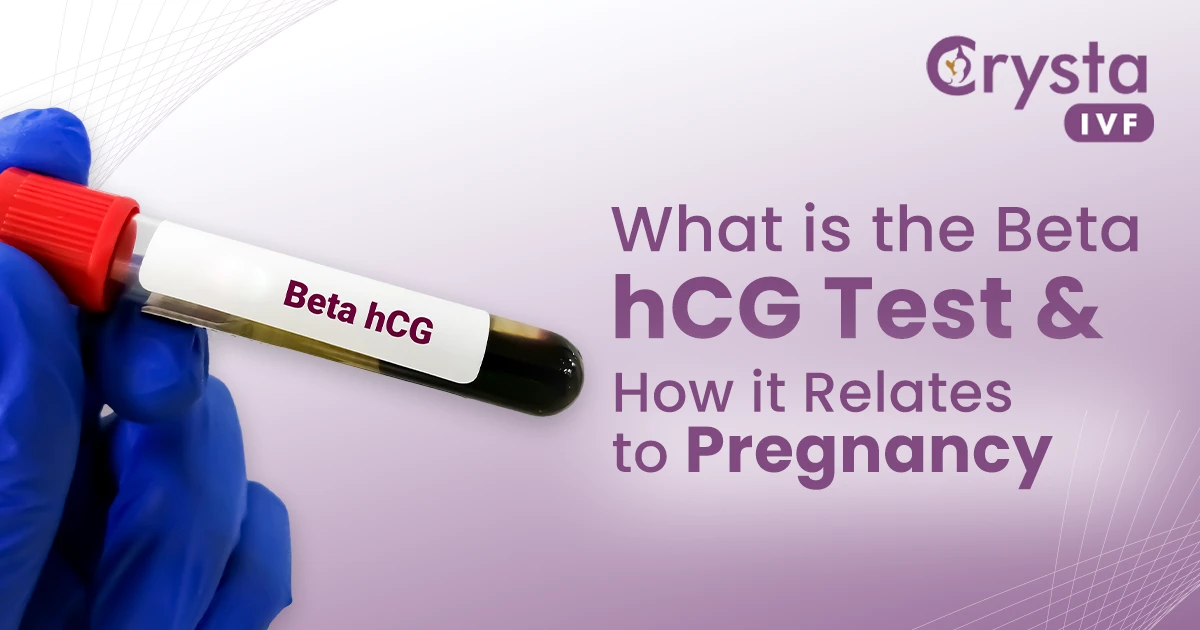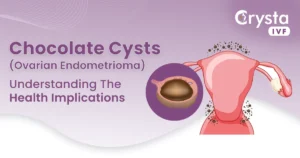For many women, the journey to parenthood starts with a simple yet significant question: “Am I pregnant?” Then, it starts a series of pregnancy tests and various hormone checks. The beta-human chorionic gonadotropin or Beta hCG test is crucial among these. But what exactly is this test, and how does it relate to pregnancy?
This article delves into the science behind the beta hCG test, its role in confirming pregnancy, and its wider applications in understanding fetal development and potential complications.
Understanding hCG
Human chorionic gonadotropin (hCG) is a hormone the developing placenta produces shortly after conception. Its primary function is to signal the corpus luteum (a temporary structure in the ovary that takes the place of the egg released from the Ovarian follicles) to continue producing progesterone, an essential hormone for early pregnancy maintenance. As the pregnancy progresses, the placenta takes over progesterone production, but hCG plays a vital role throughout gestation.
Also Read: When Should You Take A Pregnancy Test?
Difference Between Beta hCG Test and hCG Test
Although both sound similar, the key difference between the Beta hCG test and the hCG test is that beta hCG is the free form of the human chorionic gonadotropin. At the same time, hCG is the total form of human chorionic gonadotropin.
Understanding Beta hCG Test
Beta-hCG test measures the amount of human chorionic gonadotropin (hCG) in the blood. After conception, this hormone is produced ten days later. Early in pregnancy, levels of hCG rise quickly in healthy pregnancies. A higher-than-usual level indicates pregnancy. If the beta hcg test for pregnancy levels rises over time, it can be determined through serial tests whether or not a pregnancy is progressing normally.
Other names for the Beta hCG Test are:
- Quantitative blood pregnancy test
- Quantitative hCG test
- Quantitative serial beta-hCG test
- Repeat quantitative beta-hCG test
- hCG blood test
What does Beta hCG Measure?
Beta HCG level in pregnancy measures the hCG levels in the body through blood or urine. Quantitative tests check the amount of hCG present in urine or blood, whereas qualitative tests identify the presence of hCG in either sample.
The urine test is qualitative. It can only indicate whether the sample contains hCG positively or negatively. The qualitative hCG blood test is in the same boat.4 If the hCG test is positive, it indicates a pregnancy; if it is negative, it indicates no pregnancy.
On the other hand, the beta-hCG test is a quantitative test that determines the precise concentration of the hormone in the blood and whether it is present. The unit of measurement for hCG levels is milli-international units per milliliter or mIU/ml.4 Early in pregnancy, beta-hCG levels are low; they rise during the first trimester and into the second.
Uses of Beta-hCG Tests
During an early prenatal visit, the beta-hCG test may be performed to confirm pregnancy (as a follow-up to a positive at-home or in-office urine test). However, the beta hCG test is not always performed or required in normal pregnancies. Instead, during pregnancy confirmation visits, many practitioners use transvaginal ultrasound to see the gestational sac, which is visible evidence of the pregnancy.
Beta-hCG levels can also be periodically checked during the first and second trimesters of a high-risk pregnancy when there is a history of miscarriage or a high risk of miscarriage.
Beta hCG Test is also done when there are risks involved with pregnancy, such as miscarriage. Repeated testing every two to three days is necessary to know how quickly the hCG levels are rising.
To determine whether your infertility treatments were successful, your doctor might prescribe a beta-hCG test right before your period is due. To guarantee that the medication has left the body and won’t influence test results, doctors who treat women receiving hCG shots to increase their chances of conception or as part of intrauterine insemination (IUI) or in vitro fertilization (IVF) must carefully schedule a beta-hCG test.
Other uses of beta-hCG test:
Beta hCG is also done to know the age of the fetus. A fairly accurate gestational age can be obtained by measuring the hormone’s concentration in the blood, which enables medical professionals to predict the due dates and time of conception.
Beta hCG Levels in Pregnancy
The following are the typical ranges of hCG levels during pregnancy. These ranges are just guidelines, as every pregnancy is different.
Expected B hcg normal range in the First Trimester
| Time Since Last Period | hCG Range (if Pregnant) |
| 3 Weeks | 5 to 72 mIU/ml |
| 4 Weeks | 10 to 708 mIU/ml |
| 5 Weeks | 217 to 8,245 mIU/ml |
| 6 Weeks | 152 to 32,177 mIU/ml |
| 7 Weeks | 4,059 to 153,767 mIU/ml |
| 8 Weeks | 31,366 to 149,094 mIU/ml |
| 9 Weeks | 59,109 to 135,901 mIU/ml |
| 10 Weeks | 44,186 to 170,409 mIU/ml |
| 12 Weeks | 27,107 to 201,165 mIU/ml |
However, one point to remember is that the main predictor of a healthy pregnancy is not whether you have high or low hormone levels. This is because a variety of factors, such as maternal smoking, weight, ethnicity, parity (the number of pregnancies a woman has had), and hyperemesis gravidarum (severe morning sickness), can affect total hCG levels.
Instead, medical professionals check if hCG levels double from their initial level every 48 to 72 hours. Since it’s typical for hCG levels to peak between 8 and 11 weeks of gestation, then decline, and then level off, this is what they look for in the first few weeks of pregnancy.
Also Read: What Are The Various IVF Tests Performed Before Undergoing IVF?
If Beta-hCG Levels Are Lower Than Expected
If your beta hCG test report levels are low, you’ll probably get a second test in a few days to see if your levels are rising or falling. Your beta-hCG levels may indicate one of the following if they are lower than anticipated and do not rise:
- Miscalculated gestational age: hCG levels would be lower than expected if conception occurred later than presumed.
- Possible miscarriage: since the placenta produces hCG, hCG levels will be low if development stops before the placenta is formed or is finished forming.
- Ectopic pregnancy: hCG levels do not rise as expected and may plateau with ectopic pregnancies.
- Blighted ovum: the fertilized egg implants in the uterus wall, but the embryo fails to develop.
If Beta-hCG Levels Are Higher Than Expected
However, some uncommon complications can result in elevated levels of Beta hCG. However, higher-than-expected hCG levels are less medically concerning than low hCG levels. Up until the second trimester, beta-hCG levels typically increase before starting to decline. Your beta-hCG levels could be higher than normal for the following reasons:
- A multiples pregnancy: twins or triplets could be present. Multiples are not uncommon in those who have undergone fertility treatments.
- Incorrect conception date: the pregnancy could be more advanced than suspected.
- Molar pregnancy: a rare complication that occurs when a mass of tissue grows inside of the uterus instead of a placenta. This complication is usually discovered at around 12 weeks gestation.
Conclusion: Understanding Beta hCG in Your Pregnancy Journey
The beta hCG test offers valuable insights into your pregnancy journey, but interpreting its results requires professional guidance. While the provided ranges offer a general idea, remember that individual factors and gestational age influence levels. Early detection, monitoring progress, and understanding potential concerns are all crucial aspects of pregnancy care.
For personalized support and expert guidance throughout your fertility journey, consider Crysta IVF. Our team of experienced specialists utilizes advanced technologies and compassionate care to help you achieve your parenthood dreams. Contact Crysta IVF today to discuss your unique needs and explore personalized treatment options. Remember, navigating pregnancy and fertility concerns doesn’t have to be a journey you take alone.
FAQs
1. What is a positive beta hCG test?
A positive beta hCG test means the test detected Human Chorionic Gonadotropin (hCG) hormone in your blood, typically indicating pregnancy. However, confirmation and interpretation require the guidance of a healthcare professional.
2. What level of beta hCG confirms pregnancy?
There’s no single “confirming” level as hCG rises gradually. Levels above five mIU/mL generally suggest pregnancy, but consulting a healthcare professional for interpretation is crucial.
3. When should a beta hCG test be done?
Timing depends on your situation. Early detection can be done ten days after conception (though home tests might be negative then). Consult your doctor for specific timing advice.
4. What if my beta hCG level is lower than expected?
Lower-than-expected levels might raise concerns about potential complications like miscarriage or ectopic pregnancy. However, interpretation requires expertise, as individual variations and gestational age are important factors. Seek professional guidance.
5. What if my beta hCG level is higher than expected?
Elevated levels could indicate various possibilities, including multiples, gestational trophoblastic disease, or certain tumors. As with lower levels, professional interpretation is essential when considering your medical history.




